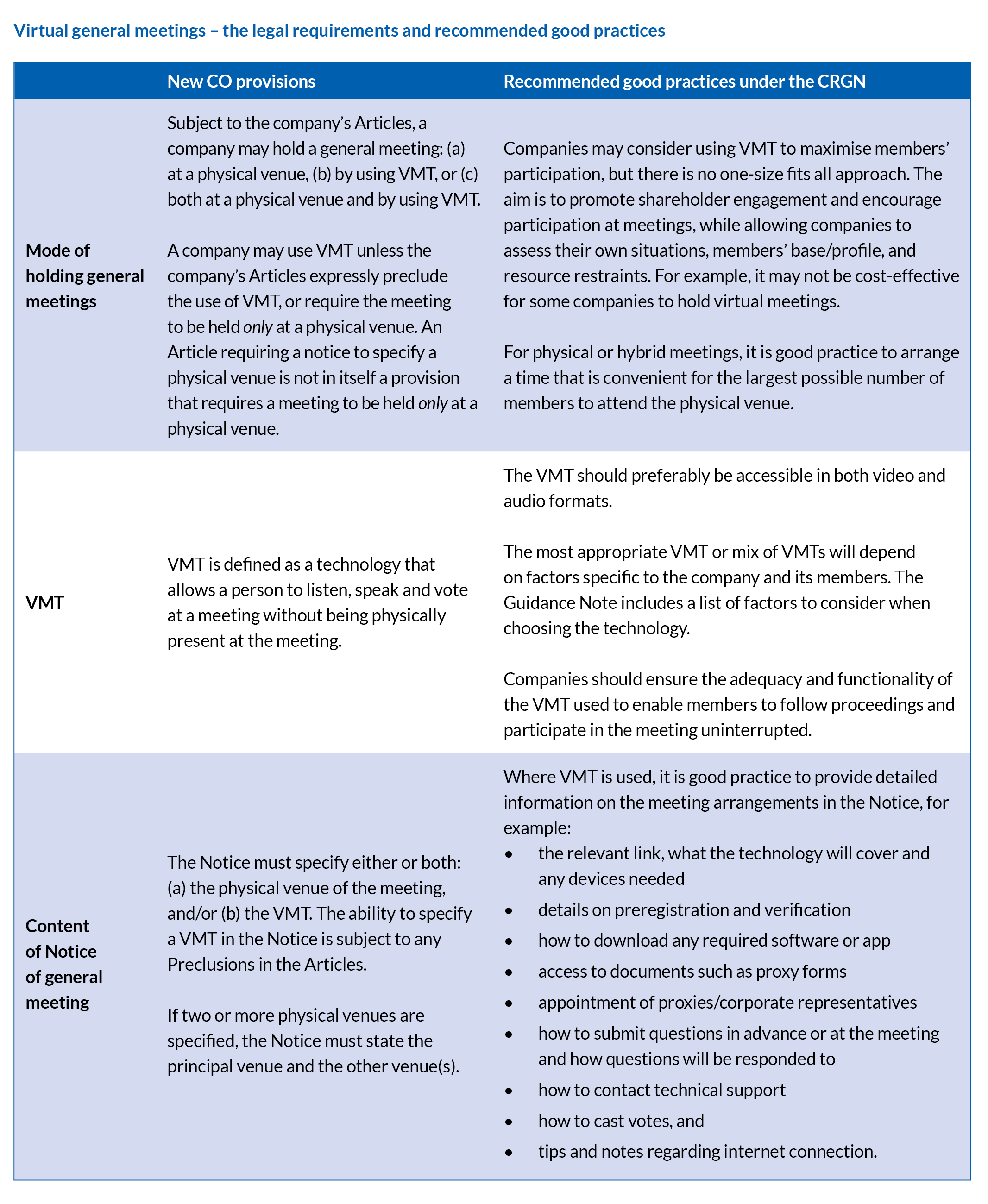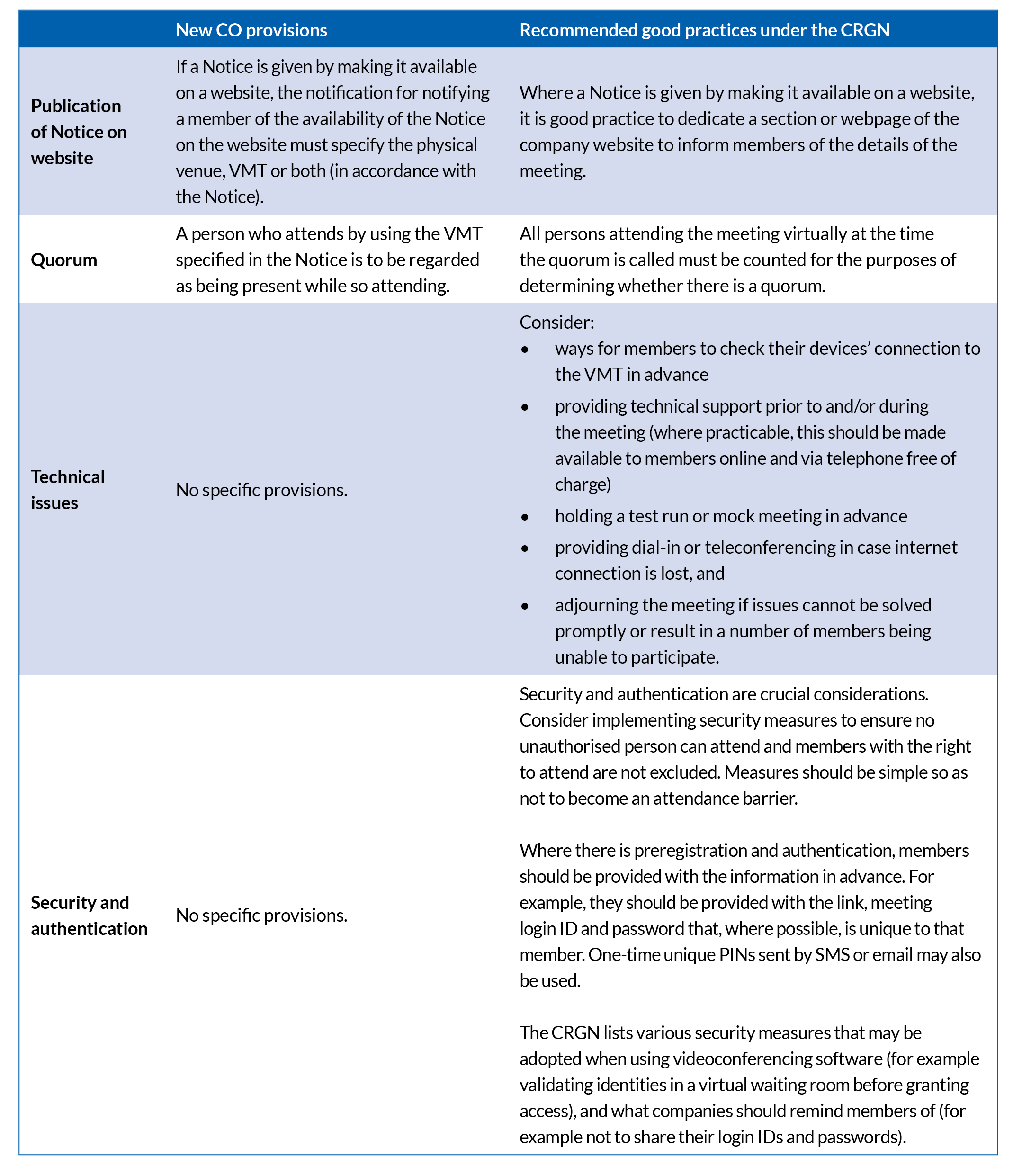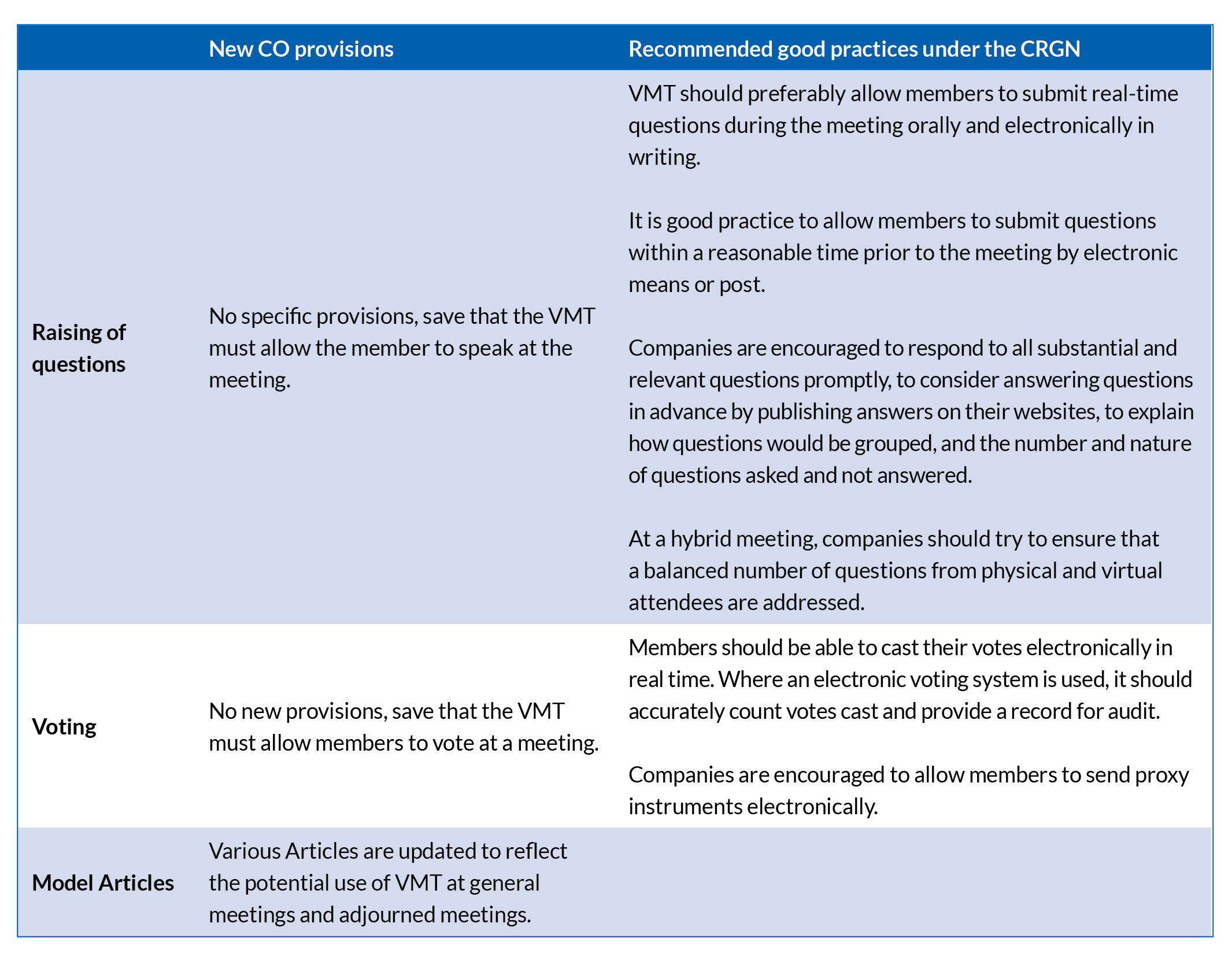On 28 April 2023, Hong Kong’s new statutory regime for holding general meetings came into effect. Benita Yu FCG HKFCG, Senior Partner, and Vincent Chan, Partner, Slaughter and May, update CGj readers on the new legal requirements and recommended good practices for holding hybrid or virtual general meetings.
With effect from 28 April 2023, the Hong Kong Companies Ordinance (CO) and Companies Model Articles Notice (Model Articles) were amended to expressly cater for the scenario of Hong Kong–incorporated companies holding general meetings that are fully virtual or hybrid – the latter being meetings that are attended both at physical location(s) and using virtual meeting technology (VMT). In response to this, the Hong Kong Companies Registry issued a Guidance Note – Good Practice on Holding Virtual or Hybrid General Meetings (CRGN).
Can a Hong Kong company hold fully virtual or hybrid general meetings?
The lack of an express provision in the CO dealing with virtual general meetings led to uncertainty for Hong Kong companies (particularly during the pandemic), although a general consensus emerged that hybrid meetings may be supported under the CO in the absence of contrary provisions in the Articles of Association (Articles). The CO amendments make clear that Hong Kong companies:
- can hold fully virtual or hybrid meetings if the Articles do not contain any Preclusions (see below)
- can hold hybrid meetings, but not fully virtual ones, if the Articles do not contain Preclusions 1 and 2, but 3 only, and
- cannot hold fully virtual or hybrid meetings if the Articles contain Preclusions 1 or 2.
Accordingly, subject to any contrary provisions in a company’s Articles, Hong Kong companies’ general meetings can be held either at physical location(s), or in a fully virtually or hybrid manner. Enabling provisions in Articles are not required.
Are there different rules for Hong Kong listed companies?
The amendments are only relevant for Hong Kong–incorporated companies. For Hong Kong listed companies (wherever incorporated), Hong Kong Exchanges and Clearing Ltd (HKEX) and the Securities and Futures Commission issued FAQs in 2022 noting that the Listing Rules do not impose requirements on the format for general meetings, and companies may hold fully virtual meetings if allowed under relevant company laws and the company’s Articles. HKEX updated its Guide on General Meetings (HKEX Guide) on 28 February 2023 to give guidance on listed issuers’ virtual and hybrid meetings. In brief, the HKEX Guide:
- encourages issuers to consider holding virtual or hybrid general meetings to promote shareholder engagement and participation (where permitted under the relevant company laws and constitutional documents)
- requires the notice of a general meeting to specify the meeting format (physical, virtual or hybrid) and the arrangements for a virtual or hybrid meeting, including clear instructions on how to access the VMT and preregistration and verification procedures (if any)
- requires shareholders attending virtually to be able to listen, speak, submit real time questions and cast their votes electronically in real time, with safeguards in place to validate/accurately count the votes, and requires the voting record to be provided for audit, and
- recommends holding hybrid/physical meetings at a time convenient to the largest possible number of shareholders to attend the physical venue.
The HKEX Guide also refers issuers to the CRGN and replicates some of the safeguards recommended in that document. For example, issuers should make contingency plans for technical issues, provide technical support to shareholders prior to and/or during the meeting, and should consider using authentication methods such as unique login IDs and passwords, or sending a one-time unique PIN. Where issuers implement registration and authentication, relevant information should be provided to shareholders prior to the meeting. In practice, some listed issuers may avoid fully virtual meetings due to shareholder expectations and the benefits arising out of in-person communications. One proxy adviser stated in its Hong Kong proxy voting guidelines that fully virtual meetings have the potential to curb meaningful communication with shareholders, and it would look to issuers to make robust disclosures in the event of a fully virtual meeting (for example posting the company’s answers to questions raised by shareholders on the IR section of their websites).
What should Hong Kong companies consider prior to adopting virtual or hybrid general meetings?
Whether a company should adopt VMT will depend on factors specific to the company, such as the number and location of shareholders and any resource constraints. The CRGN specifies that there is no one-size-fits-all approach – the overall aim is to opt for the most appropriate mode of meeting, having considered the best interests of the shareholders. Prior to any adoption, Hong Kong companies should consider the issues set out below.
- Assess if the company’s Articles contain any Preclusions. Articles that require a notice of general meeting (Notice) to specify a physical venue do not necessarily preclude the use of VMT, but may prevent the holding of fully virtual meetings.
- Assess if the Articles sufficiently address the risk of technical issues impacting the meeting. For example, if the VMT fails, is there an ability for the chairperson to adjourn without needing to obtain the meeting’s consent?
- Consider the content of Notices for virtual meetings in light of the statutory requirements to specify the VMT, as well as the detailed recommendations in section 3 of the CRGN.
- Choose the right technology or mix of technologies, which must allow members to listen, speak and vote at the meeting. The CRGN emphasises security and authentication as key considerations and recommends allowing members to also see the proceedings of the meeting.


 Benita Yu FCG HKFCG, Senior Partner, and Vincent Chan, Partner
Benita Yu FCG HKFCG, Senior Partner, and Vincent Chan, Partner
Slaughter and May
Benita Yu chairs the Institute’s Company Law Interest Group (CLIG). She and her co-author, Vincent Chan, have written the latest CLIG guidance note on Hong Kong’s new statutory regime for general meetings. It is available on the Institute’s website: www.hkcgi.org.hk. The authors can be contacted at: benita.yu@slaughterandmay.com and vincent.chan@slaughterandmay.com.
SIDEBAR: Preclusions
Preclusion 1. Articles expressly preclude the use of VMT for general meetings.
Preclusion 2. Articles require meetings to be held only at a physical venue.
Preclusion 3. Articles require at least one physical venue, for example requiring notice of a general meeting to specify a physical venue.



